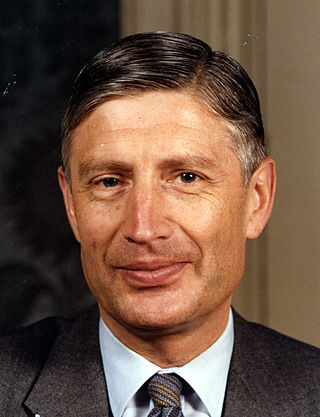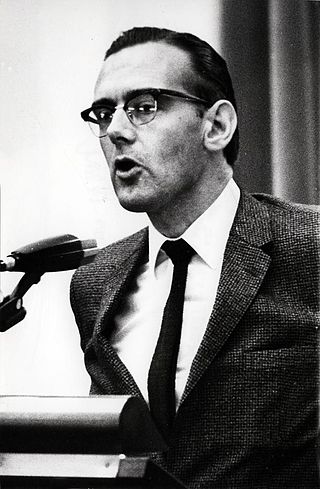
The People's Party for Freedom and Democracy is a conservative-liberal political party in the Netherlands. The VVD, whose forerunner was the Freedom Party, is a party of the centre-right that tries to promote private enterprise and economic liberalism.
The Labour Party is a social democratic political party in the Netherlands.

The Christian Democratic Appeal is a Christian democratic and conservative political party in the Netherlands.

Andreas Antonius Maria "Dries" van Agt was a Dutch politician, jurist and diplomat who served as Prime Minister of the Netherlands from 19 December 1977 until 4 November 1982. He was a prominent leader of the Catholic People's Party (KVP) and later its successor party, the Christian Democratic Appeal (CDA).

Petrus Jozef Sietse "Piet" de Jong was a Dutch politician and naval officer who served as Prime Minister of the Netherlands from 1967 to 1971. He was a member of the now-defunct Catholic People's Party (KVP), later merged into the current-day Christian Democratic Appeal (CDA).

The Anti-Revolutionary Party was a Protestant conservative and Christian democratic political party in the Netherlands. The party was founded in 1879 by Abraham Kuyper, a neo-Calvinist theologian and minister. In 1980 the party merged with the Catholic People's Party (KVP) and the Christian Historical Union (CHU) to form the Christian Democratic Appeal (CDA).

The Catholic People's Party was a Catholic Christian democratic political party in the Netherlands. The party was founded in 1945 as a continuation of the interwar Roman Catholic State Party, which was in turn a successor of the General League of Roman Catholic Caucuses. The party was in government throughout its existence. In 1977, a federation of parties including the Catholic People's Party, the Anti-Revolutionary Party (ARP) and the Christian Historical Union (CHU) ran together under the Christian Democratic Appeal (CDA) banner. The three participating parties formally dissolved to form the CDA in 1980.

The Christian Historical Union was a Protestant Christian democratic political party in the Netherlands. The CHU is one of the predecessors of the Christian Democratic Appeal (CDA), into which it merged in September 1980.

The Political Party of Radicals was a Christian-radical and green political party in the Netherlands. The PPR played a relatively small role in Dutch politics and merged with other left-wing parties to form GroenLinks in 1991.

The first Van Agt cabinet, also called the Van Agt–Wiegel cabinet was the executive branch of the Dutch Government from 19 December 1977 until 11 September 1981. The cabinet was formed by the christian-democratic Christian Democratic Appeal (CDA) and the conservative-liberal People's Party for Freedom and Democracy (VVD) after the election of 1977. The cabinet was a centre-right coalition and had a slim majority in the House of Representatives with Christian Democratic Leader Dries van Agt serving as Prime Minister. Liberal Leader Hans Wiegel served as Deputy Prime Minister and Minister of the Interior.

The Den Uyl cabinet was the executive branch of the Dutch Government from 11 May 1973 until 19 December 1977. The cabinet was formed by the social-democratic Labour Party (PvdA), the christian-democratic Catholic People's Party (KVP) and Anti-Revolutionary Party (ARP), the progressive Political Party of Radicals (PPR) and the social-liberal Democrats 66 (D'66) after the election of 1972. The cabinet was a Centre-left grand coalition and had a substantial majority in the House of Representatives with Labour Leader Joop den Uyl serving as Prime Minister. Prominent Catholic politician Dries van Agt, the Minister of Justice from the previous cabinet, served as Deputy Prime Minister until his resignation. Prominent Protestant politician Gaius de Gaay Fortman the Minister of the Interior assumed the office of Deputy Prime Minister on 8 September 1977.

This article gives an overview of Christian democracy in the Netherlands, which is also called confessionalism, including political Catholicism and Protestantism.
Roman/Red is the nickname for a period in Dutch politics between approximately 1945 and 1958. This period was characterized by coalitions between the Catholic and social-democratic parties in the Netherlands and Belgium. "Roman" refers to the parties with Roman Catholic affiliation, and "red" refers to the colour associated with social democrats. During the Roman/Red period, the Catholic People's Party (KVP) and the social-democratic Labour Party (PvdA) formed the core of several 'Roman/Red' cabinets, led primarily by Willem Drees.

Leo de Block was a Dutch politician of the defunct Catholic People's Party (KVP) now merged into the Christian Democratic Appeal (CDA) party and businessman.

Sybrand van Haersma Buma is a Dutch politician serving as Mayor of Leeuwarden since 2019. Until 2019, he was a member of the House of Representatives from 2002 who also served as the parliamentary leader of the Christian Democratic Appeal (CDA) from 2010 and as the leader of his party from 2012.

Henricus Antonius Cornelis Marie "Harrij" Notenboom was a Dutch politician. He served as member of the House of Representatives from 1963 to 1979 and in the European Parliament from 1971 to 1984. Notenboom was a member of the Catholic People's Party and later the Christian Democratic Appeal when the former had merged into it in 1980.

Jacobus Maria "Jacques" Aarden was a Dutch politician.

Following the Dutch general election on 17 March 2021, a cabinet formation led to the establishment of the fourth Rutte cabinet in 2022. The coalition included the People's Party for Freedom and Democracy (VVD), Democrats 66 (D66), Christian Democratic Appeal (CDA) and Christian Union (CU), the same parties from the preceding third Rutte cabinet. This formation process, lasting 299 days, was the longest formation in Dutch history.

The Night of Schmelzer was a debate in the House of the Representatives of the Netherlands that took place from 13 October to the early hours of 14 October 1966. The night was the last day of the general debate on the 1967 budget, which had started on 11 October. During the conclusion of the debate, Norbert Schmelzer, the parliamentary group leader of the Catholic People's Party (KVP), introduced a motion against the Cals cabinet. This cabinet included members from the KVP, alongside Labour Party (PvdA) en de Anti-Revolutionary Party (ARP). The motion was perceived by the cabinet as a vote of no confidence, but it was passed regardless. As a result, the cabinet resigned on 15 October.

The CDA loyalists were a group of relatively progressive members of the Dutch House of Representatives for the Christian Democratic Appeal (CDA) who were skeptical of the first Van Agt cabinet (1977–1981), which comprised the CDA and the conservative liberal People's Party for Freedom and Democracy (CDA). At the end of the 1977 cabinet formation, which had started with unsuccessful negotiations between CDA and the socialist Labour Party (PvdA), they voted against the coalition agreement between the VVD and the CDA. Although they voted against the agreement, they were willing to loyally support the cabinet, hence the name. These loyalists had an influential position during the cabinet period, because the cabinet only had a majority of 77 out of 150 seats including them.

















